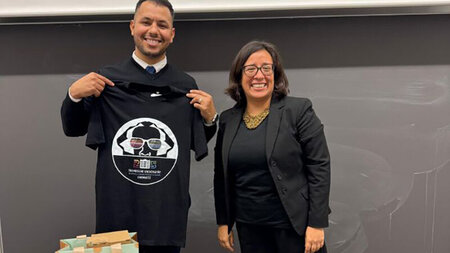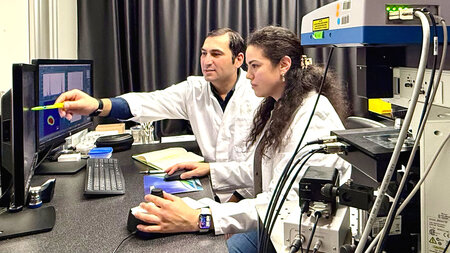Study Semester Abroad 
The online application tool for stays in the 2026/27 winter semester or 2027 summer semester will be activated on December 1, 2025.
What does the Erasmus+ programme offer in terms of study stay abroad?
- One or more study periods abroad per study phase (BA, MA, PhD) at one of the Erasmus+ partner universities of Chemnitz University of Technology, each lasting at least two months and totalling a maximum of 12 months. Multiple mobility is therefore possible! Alternatively, under certain conditions, a short-term study visit of 5-30 days can also be completed (students: a virtual component is also mandatory; doctoral students: virtual component not mandatory).
- Exemption from tuition fees at your host institution.
- Academic recognition of credits for study undertaken abroad by your home faculty and via the Diploma Supplement. Recognition of study credits must be agreed with your faculty (in consultation with the examination board) prior to your departure as part of your Learning Agreement. On your return you should submit evidence that you have successfully completed your courses, in the form of a transcript of records from your host institution.
- A mobility allowance dependent on your country group to offset any additional costs incurred during your visit; opportunity for participants with children or with physical, mental or health-related conditions to apply for special needs support.
- Specialist subject and linguistic preparation prior to departure and support from your host institution with accommodation, cultural activities, etc.
The level of your mobility allowance will depend on available funds and the number of participating students. The allowance varies from year to year and from institution to institution.
Eligibility criteria
The following criteria must be met in order to qualify for funding under the Erasmus+ programme:
- You must be enrolled at Chemnitz University of Technology (undergraduate, masters, doctorate).
- You must have successfully completed at least one year of undergraduate study.
- You must not have exhausted your 12-month Erasmus+ mobility allowance in your current study phase (BA, MA).
- A Learning Agreement must be prepared in collaboration with your home institution's subject coordinator and examination board and your host institution prior to the start of study abroad.
- There must be a valid Erasmus+ exchange agreement with the Erasmus+ partner institution.in respect of the relevant academic year (and subject area).
- You must have acquired sufficient knowledge of the teaching language (min. level B1 at the time of application) for your intended course of study.
Financial support
Decisions about whether you will be allocated financial support from Erasmus+ funds will be made on the basis of your application documentation (see section: Application) and will be communicated to you by the International Office once allocations have been made by the funding body.
Rates of support:
- Country Group 1 (Austria, Belgium, Denmark, Finland, France, Ireland, Iceland,
Italy, Liechtenstein, Luxembourg, Netherlands, Norway, Sweden): 600,- € monthly - Country Groups 2 and 3 (Group 2: Estonia, Greece, Latvia, Malta, Portugal,
Slovakia, Slovenia, Spain, Czech Republic, Cyprus, Group 3: Bulgaria, Croatia,
Lithuania, North Macedonia, Poland, Romania, Serbia, Turkey, Hungary): 540,- € monthly
Travel expense allowance
One-off distance-dependent travel expense allowance for standard travel or ‘green travel’:

Calulated by using EU Distance Calculator Link to Distance Calculator If the travel allowance to which you are entitled does not cover at least 70% of the actual travel costs, you can submit an application to the IUZ for ‘extraordinary costs for expensive travel’ and must submit appropriate evidence for this.
Additional funding:
- 'travel': additional funding of up to 2 travel days for non-environmentally friendly travel if an existing need is claimed (proof of need)
- 'green travel': higher travel allowance (see table above) in case of environmentally friendly travel for the main part of the outward and return journey (use of low-emission means of transport such as bus, train, bicycle, carpooling, etc.) and in case of financial need additional funding of up to 6 travel days (declaration on honour)
- broad category of persons with 'fewer opportunities': monthly top up of 250,- € and further funding, see Inclusion
Language support
- Online Language Support (OLS), after online language test in the main teaching language access to online language courses as an additional linguistic preparation, Link to OLS/EU academy website
- Information on access to OLS will be provided to all Erasmus+ funded students by the International office
- Please also continue to use the free UNICERT language courses from the Languages Hub (Zentrum für Fremdsprachen) in your preparation
Recognition of study credits
- Full recognition of study credits gained abroad is agreed in principle and this should be confirmed with your Erasmus subject coordinator and examination board as part of your Learning Agreement. Further details in the guidance on completing your Learning Agreement
- After you have submitted your record of achievement (Transcript of Records) following your study stay, your study credits will be recognised by the relevant examination board and registered by the Central Examinations Office
- Your Erasmus study visit will automatically be recorded in your diploma supplement
- After your return, the International Office will send you a certificate attesting to your participation in the Erasmus+ programme with details of your course of study, host institution and length of stay
Application and preparation
IMPORTANT: There is only ever a single (!) application window for the forthcoming academic year – so this relates to study visits both in the winter semester and in the following summer semester. The application window for a given academic year (e.g. winter semester 2026/2027 – summer semester 2027) always opens at least 10 months in advance, i.e. in the December of the preceding winter semester (in this example, Winter semester 2025/2026).
- Apply for an exchange place (Dec – Jan/Feb) via your department/faculty’s subject coordinator – contact them early to confirm the deadline for applications. Documents: Letter of motivation, TUC enrolment certificate, current transcript of grades, language certificate for the language of instruction, if applicable
- Once your place is confirmed, submit separate application to host institution (by the deadline!)
- Apply for Erasmus+ programme and support grants via the online application on the International Office homepage (= for funding, tuition fee waiver, etc., documents: letter of motivation, TUC enrolment certificate, current transcript of grades, language certificate for language of instruction if applicable). Carriy out online application and submit application form signed by you and your subject coordinator, by 31 March at the latest to International Office. Candidates will be chosen on the basis of how well they meet the eligibility criteria set out in the “Contents” section, the subject-relevance of/motivation for the intended visit and candidate grades. The International Office will inform all applicants about the outcome of their applications in a timely manner.
- Complete the Online Learning Agreement form (intended course of study at host institution, min. 20 ECTS credits) supplied to individuals by the International Office: Guidelines on completing LA Submit to International Office at least four weeks before (!) departure. A link to courses offered by partner institutions is available in the partner institution message box on the map.
- Sign the Erasmus+ grant agreement at the International Office four weeks before departure.
- Online language test in the main teaching language before study stay abroad and participation in free online language course
Online Learning Agreement (OLA)
Please fill in your Online Learning Agreement here and follow the steps described in this scheme and stick closely to the information provided in our checklist and guidelines.
The code for the subject field and the contact dates for the OLA responsible of your study programme can be found in this list.
For data protection regulations please follow this link.
Return
Please hand in the following documents at the latest two weeks after your return by e-mail at the International Office:
- Letter of Confirmation (confirmation of length of visit – issued by host institution)
- Progress Report (to iuz@tu-chemnitz.de as a Word document)
- Transcript of records (from host institution on Learning Agreement (III) Transcript of Records form), can also be submitted at a later date
- Learning Agreement (III) Recognition can be submitted at a later date
Online in Erasmus database:
- electronic EU questionnaire (automated email request)
It is essential that these documents are submitted promptly, since without this evidence your trip may have to be classified as ineligible.
Visa/Departure, etc.
- If you are a citizen of an EU Member State, you do not need a visa to enter or reside in another EU Member State.
- If you are not an EU citizen, we recommend you contact the relevant immigration authority, the embassy of your home country and the embassy of your host country promptly regarding travel formalities.
- You will need a visa to reside in Turkey for a stay of more than 90 days whether you have EU citizenship or not. You should apply for this in good time from the relevant Turkish consulate.
- A German identity card or passport (recommended) is in principle sufficient for entry to Norway.
- Whatever the country of destination for your Erasmus+ trip, you should consult the Foreign Office Homepage for travel and safety guidance relating to your host country. You can also register electronically on the homepage for the duration of your study visit abroad.
Insurance
- Please ensure that you have adequate health insurance cover. It is strongly recommended to additionally take out a private travel health insurance. If you are unsure, please contact your health insurance company in good time. Neither the Erasmus+ programme nor the TU Chemnitz provides insurance cover.
- If you wish to extend your cover, it you may purchase extra personal liability and/or accident insurance cover for your time abroad. Almost all well-known insurance providers supply these products.
- The Deutsche Akademische Austauschdienst (German Academic Exchange Service, or DAAD) offers a DAAD Group Insurance Policy, which is available to Erasmus+ students if desired. This is an insurance ‘package’ providing overseas health, liability and accident insurance cover.
- Please also note the insurance advice in your Erasmus+ grant agreement.
Oliver Sachs M.A.
(Erasmus+ Outgoing)Fr: online 10.00-12.00 webroom: mytuc.org/ycqm






